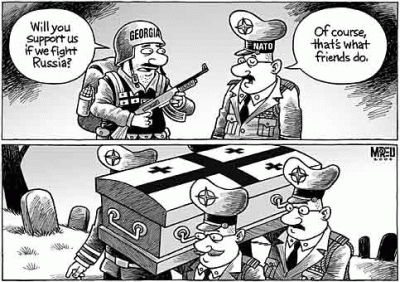
[Stuff,
New Zealand]
O Globo, Brazil
'To Explain the
Kremlin's Behavior is Not to Support It'
"It isn't because of the
communist era - or Stalinist paranoia - that Russians think they are being
surrounded by the West or dismissed by Western capitals - or both. The way they
see the world, there is no shortage of examples. … but
to explain a behavior is not to support it."
By William Waack

Translated By Brandi Miller
August 11, 2008
Brazil - O Globo
- Original Article (Portuguese)
The return of the
Russian bear is a melancholic film. In Moscow, two political factors of great
magnitude combine regarding Ossetia-Abkhazia-Georgia: wounded pride for a lost empire
and the wish to reorganize nearby regions (the “near abroad,” as the Russians
say). Is it possible that these two elements, which one would consider
“psychological” and “emotional,” explain the behavior of sovereign states? Yes,
they do.
To those who
weren't in Moscow in the moments that followed the implosion of the Soviet
Empire, it's difficult to convey the depth of humiliation that Russians felt. A
good part of the public reaction to the political reordering of the country is
tied to the fact that the expansion of the Empire wasn't just a victory for the
Bolsheviks [seized power in the 1917 Revolution  ]
- and here I directly address the tendency toward strong-arm politicians like
Vladimir Putin. Historians generally agree that this was a continuation.
]
- and here I directly address the tendency toward strong-arm politicians like
Vladimir Putin. Historians generally agree that this was a continuation.
But it isn't
because of the communist era - or Stalinist paranoia - that Russians think
they're being surrounded by the West or dismissed by Western capitals or both.
The way they see the world, there is no shortage of examples. The way NATO
expanded its boundaries to the edge of Russia, for example, perfectly served
the security needs of the States that are today part of the new Central Europe.
Posted by
WORLDMEETS.US
But in the eyes
of Moscow, this was nothing but the West taking advantage of an opportunity -
the disintegration of the Soviet Union and its dire internal upheaval - to
further limit Russia's range of action. Putin is anything but a poker player.
And in several public speeches in which he addressed the issue of relations
with the West (seen here primarily as the United States and the core countries
of the European Union) he made it quite clear that one of his objectives was to
restore lost pride.
SOME DAILY SHOW
HUMOR IN THE GEORGIA CRISIS
I'm taking care
here not to fall into the rather simplistic argument that Russia's stance on the
separatist provinces and Georgia itself is a “justified” reaction by Moscow to
the way the West has treated it … And the way the United States went to war in
the Middle East; or the way that the major Western countries have recognized
the independence of Kosovo from Serbia, a former client of Moscow. After all,
to explain a behavior (in this case, of the Russians) is not to support it.
Nor for the
moment am I interested in making a moral judgment. Powers act according to
their interests, especially with regard to their neighbors, and the use of
force has never been ruled out of international relations. You can characterize
it as cynicism and amoral behavior - I prefer the old German expression “Realpolitik  .”
.”
Posted by
WORLDMEETS.US
The problem here
is to establish whether the paths of “Realpolitik”
chosen by Putin in Georgia to restore Russia, makes it an even stronger global
power - or simply strong, but unreliable. And if Putin’s conduct in relation to
foreign investment increases Russia's global economic bargaining power, or just
makes it an undesirable partner. And if the belief that
countries like Georgia or Ukraine are now enemies for having gone
through more extensive political reforms than Russia, helps Moscow forge a
strategic partnership with Europe, or rather, whether it pushes it farther away
from an important long-term objective.
Living with Russia
just became more difficult. And that may be just what Putin wants.
CLICK
HERE FOR PORTUGUESE VERSION
FROM AROUND EUROPE ON THE
GEORGIA CRISIS:
Rceczpospolita,
Poland
Banish All 'Magical
Thinking' Regarding the Russian Bear
http://worldmeets.us/rzeczpospolita000005.shtml
Gazeta Wyborcza, Poland
'Enormous Error'
of President Bush's 'Georgian Protege'
http://worldmeets.us/gazetawyborcza000018.shtml
Cotidianul,
Romania
Georgia Can 'Kiss
NATO Goodbye'
http://worldmeets.us/cotidianul000002.shtml
Frankfurter Rundschau,
Germany
Georgia: The Proxy
War that Could Go Global
http://worldmeets.us/frankfurterrundschau000032.shtml
Dernières Nouvelles d'Alsace, France
With Total Victory
Achieved, Russia 'Withdraws'
http://worldmeets.us/dna000021.shtml
Rue 89, France
East Europe Best
Not Depend on 'Obsolete' NATO
http://worldmeets.us/rue89000015.shtml
Liberation, France
The Russian
President 'Dictates His Peace' to Hapless Europe
http://worldmeets.us/liberation000115.shtml
Le Figaro, France
In South Ossetia,
'Kosovo Backfires'
http://worldmeets.us/lefigaro0000231.shtml
Le Figaro, France
Between America
and Russia, the E.U. is On the Front Line
http://worldmeets.us/lefigaro0000229.shtml
Le Figaro, France
War in the
Caucasus: Georgia 'Doesn’t Stand a Chance'
http://worldmeets.us/lefigaro0000228.shtml
Kommersant, Russia
The Kremlin Offers
'an Ultimatum' to America
http://worldmeets.us/kommersant000038.shtml
Novosti,
Russia
The Americans
Finally Launch Operation 'Saakasvili's Salvation'
http://worldmeets.us/novosti000061.shtml
[Posted by WORLDMEETS.US August 20, 5:45am]